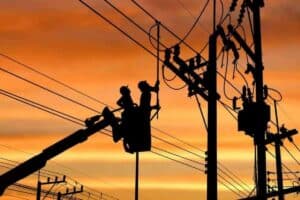The technical problems diminishing the performance of Eskom's coal-fired fleet, can be solved, says engineer.

There is no doubt in his mind that the performance of Eskom’s old coal-fired power stations can be improved, says Ron Weiss, who led the process to do exactly that for the Israel Electric Corporation. “We did it.”
For the past six years he has been CEO of the Rwanda Energy Group and is one of few top electricity executives with management experience in both developed markets and Africa.
Weiss says the problems with older plants are usually located in the boilers.
The turbine and generators perform well, but the boilers need refurbishment, which includes the replacement of pipes to end boiler tube leaks that limit the performance of units.
“As an engineer, nobody can tell me it cannot be done,” says Weiss.
Eskom implements load shedding due to unplanned breakages
Eskom has been battling with the declining performance of its coal-fired fleet with the availability of the total Eskom fleet averaging 54% so far this year.
On average, more than a third of the generation capacity has been offline due to unplanned breakages.
This has manifested in mostly daily load shedding that has frequently intensified to leave end users without electricity for between four and 10 hours per day.
‘Rampant corruption’: Root cause of neglect not technical
Weiss cautions however that the root causes of the neglect of the power stations are not technical and therefore do not need a technical solution.
“It is all about interests,” he says.
He says working in Africa is very different from working elsewhere in the world due to the rampant corruption.
He notes that former Eskom boss André de Ruyter’s strategy of fighting corruption head-on didn’t give the expected results – the challenge requires different strategies.
ALSO READ: Makwana’s departure ‘an indication that something not well’ at Eskom
Eskom should privatise coal management
He believes Eskom must privatise some of its functions like coal management to achieve better performance.
Weiss says the current situation with daily load shedding in South Africa is very extreme within the global industry and that even the software Eskom developed to ensure consumers know when their electricity will be off is unique.
The job of heading Eskom is currently seen as the biggest challenge in the industry worldwide, he says.
ALSO READ: Look at those over 60s, Gordhan reportedly tells Eskom on CEO search
Coal quality, outsourced maintenance trip up Eskom
Tommy Wedderspoon, sector coordinator at trade union Solidarity, agrees with Weiss that the performance of Eskom’s coal fleet can be improved.
He says a crucial factor is the bad quality coal provided by small suppliers after Eskom shifted its coal procurement away from big mining houses.
The poor-quality coal is often not much more than stones, is very abrasive, and leads to increased wear and tear, especially on boiler tubes, mills and flue ducts, says Wedderspoon.
In addition, he notes, Eskom has outsourced maintenance and must go through a procurement process before a breakdown can be fixed.
“It’s like having a flat tyre on your car and having to wait for a month to have it fixed.”
ALSO READ: Electricity minister and staff will spark for R13m a year
Refurbish ‘makes sense’
Wedderspoon says it makes sense to refurbish existing stations in light of the extensive groundworks and civil construction work done on the sites to, for example, prevent the ground being contaminated in case of an oil spill.
“The high voltage yard has an underground copper lining and in fact the whole power station has an underground lining.”
He says while the boilers may need refurbishment, the other structures are still good.
Increased coal fleet maintenance like ‘flogging a dead horse’, but…
Solidarity’s Helgard Cronje, deputy general secretary, public sector, says despite De Ruyter describing efforts to improve the performance of the coal-fired power stations as “flogging a dead horse”, the utility had – under his and former COO Jan Oberholzer’s management – increased maintenance “and even though they left, it seems Eskom is persisting with it”.
Even when it means more intense load shedding in the short-term, for some long-term benefit, he adds.
ALSO READ: Former Eskom CEO André de Ruyter lands American dream job
Cronje says realistically speaking some of the stations are very old and one cannot expect them to perform like new ones, but they can do better than currently.
He adds that the capture of Eskom’s procurement processes and pressure on cash flow sometimes leave power stations without spares for emergency repairs, which delays repairs and impacts the overall performance.
This article is republished from Moneyweb under a Creative Commons licence. Read the original article.
NOW READ: Former Eskom employees among those targeted as Sars raids coal smuggling syndicate
Support Local Journalism
Add The Citizen as a Preferred Source on Google and follow us on Google News to see more of our trusted reporting in Google News and Top Stories.






